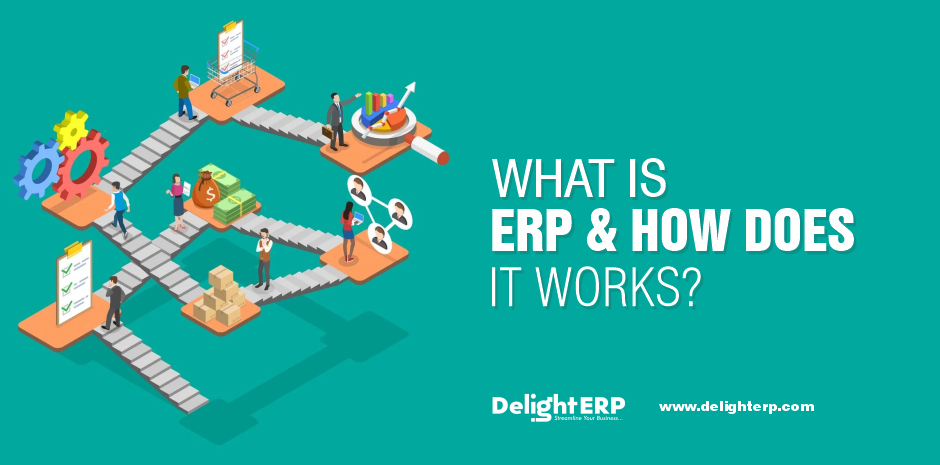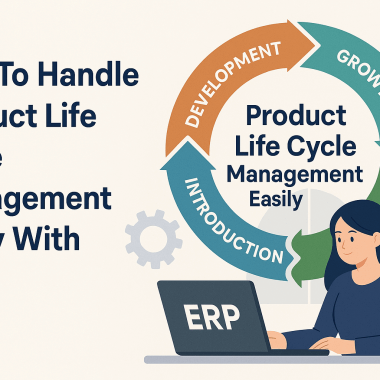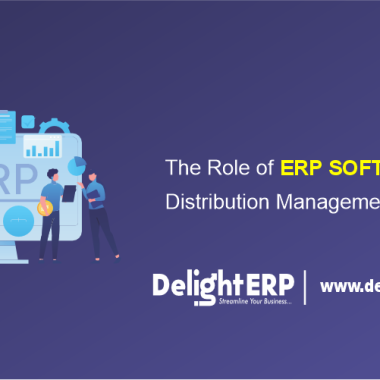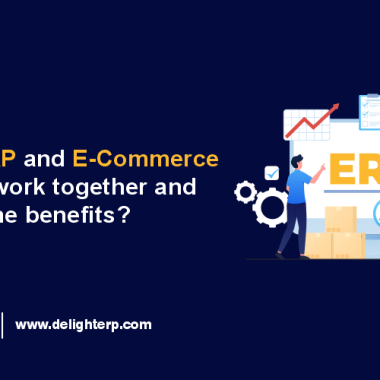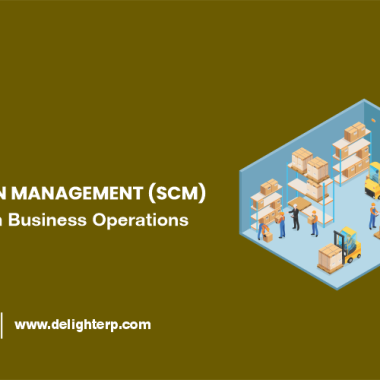Introduction
Enterprise Resource Planning (ERP)
Doing manual business activities can be challenging, but the right Enterprise Resource Planning (ERP) software allows the company to automate its business operations.
Enterprise Resource Planning (ERP) is software that helps organizations to automate and manage core business processes to get an outcome. ERP software streamlines the flow of data between a company’s business processes, providing a single source of truth and streamlining operations across the company. It can integrate the finance, supply chain, operations, marketing, reporting, manufacturing, and human resources of a company on one platform.
Most businesses have financial and operational systems in place, but a robust system cannot survive day-to-day business processes or contribute to future business growth. As businesses grow and their needs change, their processes must evolve. In this article, you will learn what ERP is and why having the right software in place can help you run a more efficient business.
It coordinates the flow of data between a company’s business processes such as supply chain management, risk management, compliance, operations, commerce, reporting, the company’s financials, manufacturing, and human resources in one platform.
How does it work?
A good Enterprise Resource Planning (ERP) System eliminates duplicate data and provides data integrity by collecting companies’ shared transactional data from different sources.
ERP Solution makes it easy for leaders to manage the entire operation of their business, avoiding errors and repetition of data. Additionally, companies will reduce unnecessary data sources. They still ensure and improve business operations and revenue.
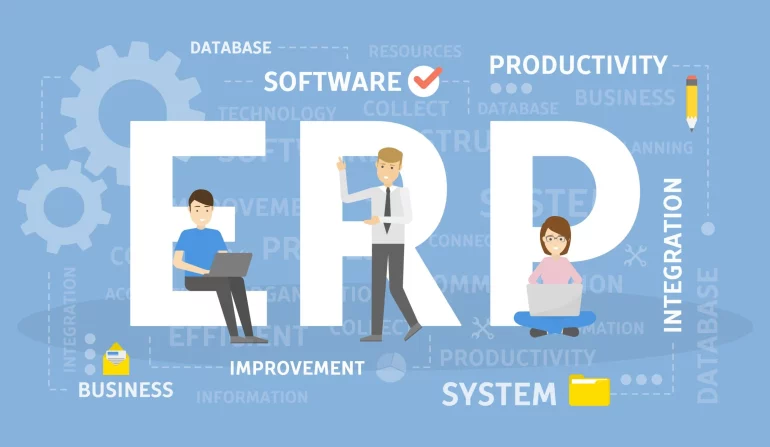
The system’s modules work together to provide automation, integration, and better intelligence.
Automation of important tasks and repetitive tasks, so your staff can spend more time on value-added work instead of running reports.
Integration of different parts of your business, each department is talking with each other and working from the same information source.
Better intelligence through shared assets, real-time data, and collaborative working.
When choosing an ERP system, companies can choose the modules that best suit their operations and can scale up their business.
It is available as a cloud subscription model or through a licensing arrangement with the software installed on your servers and accessed remotely by the designated users.
How to decide when your Business needs Enterprise Resource Planning (ERP)?
Companies face different challenges to run their business. Here the question is, how to decide does your business needs ERP? The following signs indicate that you need an ERP system:-
• You can’t meet customer expectations
• You’re dealing with disparate systems
• The basics are controlling you to grow
• Your staff spends too much time doing manually.
• Critical data and information can’t be accessed.
• You don’t have quick and easy access to your data.
• You can’t be proactive when it comes to identifying issues in your business process.
• Your staff can’t share information.
• Needs too much time searching for information, gathering data, trying to increase productivity and efficiency, and integrating various functions in your business.
• Unable to monitor your inventory level.
• Lack of connectivity between different departments of the company.
If the above are the signs you are facing then it’s time to find ERP software for your business.
ERP for Industries
Organizations of all sizes, shapes, and types can benefit from ERP solutions. A small business may use an ERP system to consolidate all components of the management system. A large organization needs an ERP system to keep each of the moving pieces in one accessible place. Nonprofit organizations, like schools and charitable foundations, are also well-served by an ERP.
ERP for various Industries like:-
• Home/Kitchen appliance manufacturer/reseller
• Automobile parts manufacturer
• jewelry manufacturer
• Toys manufacturer
• Gift Article manufacturer
• FMCG resellers
• Pharmaceutical industries
• Textile industries
• Food and packaging industries
• Machinery tools manufacturing
• construction parts manufacturing
• Electronic and technology products resellers
• Paper or educational products manufacturing
• Plastic products manufacturing
• Home decor furniture products manufacturing
• Hardware manufacturing
• Ceramic tile manufacturing
• Polyplast industries.
Let’s understand what does ERP mean in Accounting?
ERP is a tool that is normally associated with functions handling large amounts of data, like operations, customer relations, and sales. But the question is, whether it is equally beneficial in handling numbers and accounting functions.
Integration of ERP and financial management of a business might seem very peculiar, as it is the impression that customarily, for accounting purposes, only accounting software can perform what is necessary.
However, the truth is that ERP Accounting software delivers much more than what simple accounting software does.
An ERP Accounting system, which automates the tasks performed by various users in the finance department of the company. Such as managers, account clerks, accountants, etc. The software could be installed cloud server which is called Cloud ERP or ERP on Cloud.
An ERP in accounting allows you to configure the system correctly so that all the transactions are accounted for accurately and reported automatically.
Additionally, it can track numerous tangible and intangible assets, like product life cycle, working hours, and other performance metrics.
When your manufacturing and distribution business is growing, you will have to increase your employee headcount, and level up your ordering. But growth can also make your business as usual more challenging, especially if expanding means the potential to grow out of your current ERP Accounting Software.
Indication That it’s Time to have an Upgrade:-
You do physical business modifications to keep up with your business’ growth, the same way your accounting systems need upgrades as well.
Check the following signs:-
• Your team is taking more time to complete minimal tasks in accounting.
• Manual processes and Excel spreadsheets.
• lack of visibility into your business.
• Invoicing takes a long time and slows cash flow.
• Inventory management is challenging.
• Manufacturing and distribution are impossible with current systems, such as work order planning, scheduling, costing, barcode inventory, reporting, COGS, etc.
If you are experiencing any of these signs, then it might be time to seriously think about moving to an Enterprise Resource Planning (ERP) system. Including ERP accounting software will allow your business to integrate and manage many key business processes in real-time, reducing redundancies, and increasing productivity.
Upgrading to an ERP will unlock many benefits, eventually allowing you to move your business to the next level.
Advantages of ERP Software:-
• Cost saving.
• Real-time view of financial data.
• Improved cash flow and Reduced working capital requirements.
• Alerts and notifications help in timely action.
• Deeper insights.
• Simplified technology information infrastructure.
• Process standardization.
• Ability to grow your business.
• Easy for reporting based on different accounting standards.
• Easy for month-end and year-end processing.
Process for implementing your New ERP Software:-
While implementing your ERP solution, planning appropriately is key. Following are the things you need to consider while getting started:-
Budget:- ERP price varies based on features and customization needs. You have to be clear on the cost associated with an ERP purchase. Here biggest variation here is consulting costs.
Resources:- If your company and the ERP vendor do not perform with proper resources for an ERP implementation, then it will struggle and most likely fail. So be sure to appoint an experienced project lead.
Change Management:- With ERP, your standard practices will change. Will your employees accept this change and is there a plan to proactively address their concerns?
On-Premises Cloud Solution:- You will need to decide if your network infrastructure can support ERP, or if you want to pursue a cloud architecture. Both have their advantages and disadvantages, so it’s important to get the one that will best suit your needs.
Vendor Selection:- Selection of the vendor is very important. Does the vendor have experience in your industry? The local vendor always has the advantage to select.
You can also check out “Benefits of ERP: Explore ERP Advantages & Disadvantages”.
Conclusion
With the fast-growing business world and technological advancements, organizations need to implement the latest tools and techniques. This will not only improve employees’ personal growth but will also enable your business to strategize and plan future growth, enabling you to keep up with the competitive pace of the business world.
As your manufacturing and distribution operations grow, your systems need to grow too. With the implementation of an ERP system, you can successfully transform your business, but careful consideration and planning must be done to ensure success.
Thus, ERP accounting systems can help you take a leap that can be the beginning of becoming a leader in your industry.

